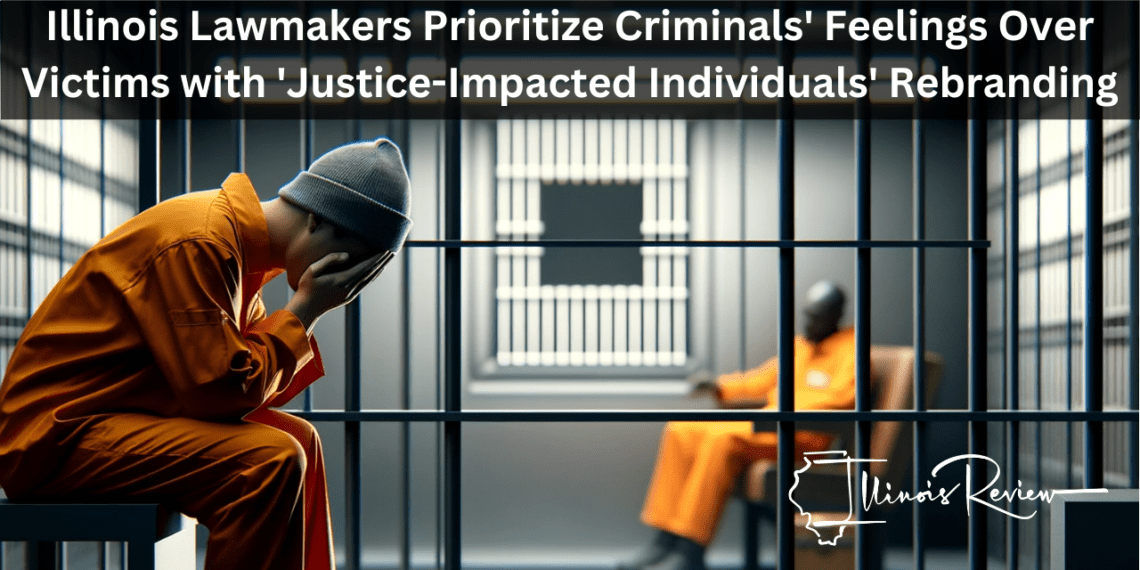Illinois is once again at the forefront of controversial legislation with House Bill 4409, a bill that aims to rebrand criminals as “justice-impacted individuals.” This move has sparked outrage among conservatives, who see it as another instance of the state prioritizing the feelings of criminals over the well-being of victims and their families.
Under this bill, the Illinois Department of Corrections would be required to adopt the term “justice-impacted individuals” instead of “offenders.” The change also mandates the addition of representation from various agencies to the Adult Redeploy Illinois (ARI) oversight board, including two members who have experienced the ARI system as offenders or as “justice-impacted individuals.”
Republicans in the state are sounding the alarm about the potential financial impact of this rebranding effort. State Sen. Terri Bryant (R) highlighted the logistical nightmare and the significant costs associated with updating every document across multiple agencies. “Over and over again, we keep changing the name of how we are referring to those who have entered into criminal activity,” Bryant stated during a recent hearing. “Each time we make that change, each agency has to update every one of their documents. It’s costing thousands and thousands of dollars just to do a name change. Why is it necessary?”
The financial implications are not the only concern. Many Republicans argue that this rebranding effort is a misguided attempt to soften the perception of criminals, thereby diminishing the accountability for their actions. State Sen. Steve McClure (R) expressed his frustration, noting the offensive nature of the term change to victims of violent crime. “There seems to be this rush to take away all accountability for people who commit crimes. If a person is going to get on the right path, they have to know they did something wrong. This apologizing for the criminal, the person who chooses to commit crimes to the detriment of our victims, the people who don’t choose to be victims of crimes, is absolutely incredible,” McClure argued.
The bill, sponsored by Democratic Illinois State Reps. Kelly M. Cassidy and Lindsey LaPointe, along with Democratic state Sens. Robert Peters, Mike Simmons, and Adriane Johnson, has been defended as a necessary step for inclusion. During the debate, Democratic state Senators tried to downplay the outrage from their Republican counterparts, emphasizing the need for more representation in the ARI program. “We’re adding the DOC, adding Human Services, Sangamon and Cook County adult probation, and two members who have experienced the ARI system as offenders or as justice-impacted individuals,” Peters said.
However, this explanation did little to quell the concerns of those who see the term “justice-impacted individual” as an unnecessary and costly euphemism. McClure pressed Peters for clarity, asking if the term “victim” would also be subject to change. Peters responded, “That means someone who has been impacted by the criminal justice system and is an individual. We don’t mess with anything in regards to the term ‘victim,’ we just change the word ‘offender’ to ‘justice-impacted individual.’”
This move to change the terminology comes at a time when Illinois is already grappling with issues related to crime and prosecution. Critics argue that the state should focus more on protecting victims and ensuring that criminals face appropriate consequences for their actions. Instead, they see this rebranding effort as a way to coddle criminals and shift the narrative away from their wrongdoing.
The bill has already passed through the Illinois House and Senate and now awaits the signature of Gov. J.B. Pritzker (D). As Illinois continues to navigate the complexities of criminal justice reform, many residents are left wondering if their state’s priorities are in the right place. Is it really necessary to spend taxpayer money on changing words to avoid hurting criminals’ feelings? Or should the focus be on ensuring justice for the victims and their families who have suffered the real impact of these crimes?
In a state plagued by fiscal mismanagement and high crime rates, this latest legislative effort raises serious questions about where Illinois lawmakers’ loyalties lie. Are they truly serving the best interests of the public, or are they more concerned with appeasing those who have chosen to break the law?
As the debate continues, one thing is clear: the voices of the victims and their families must not be drowned out by a misguided attempt to reframe criminal behavior. It’s time for Illinois to prioritize justice and accountability, not politically correct terminology.









